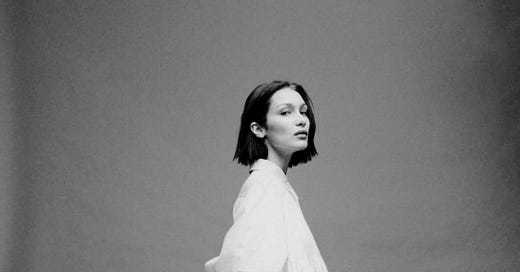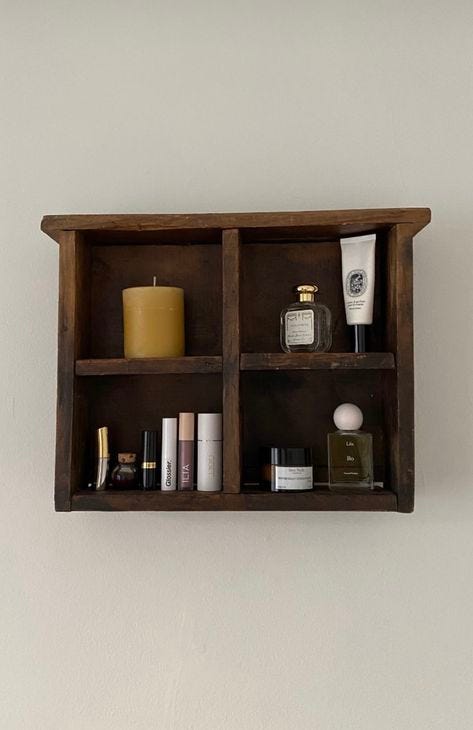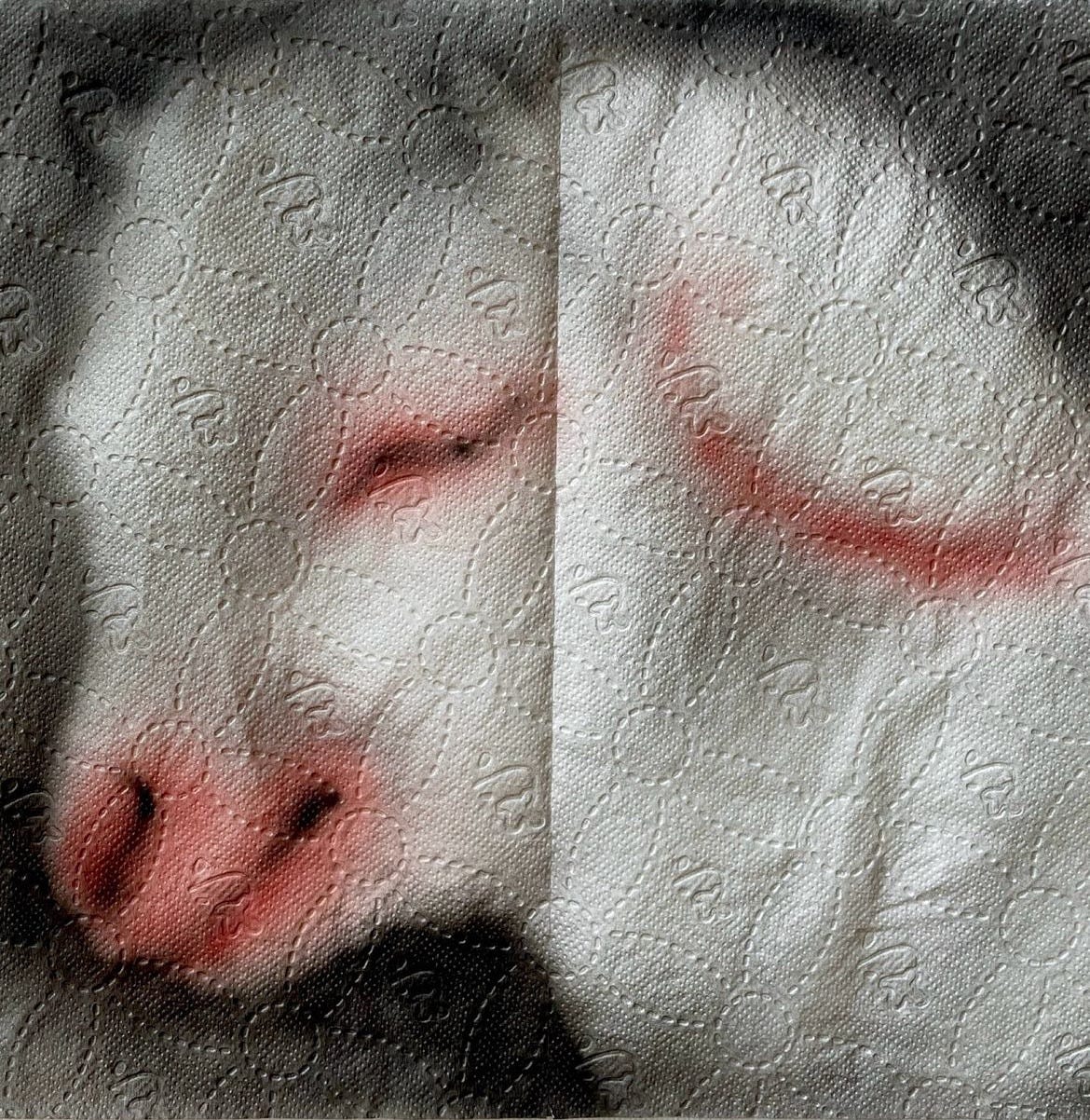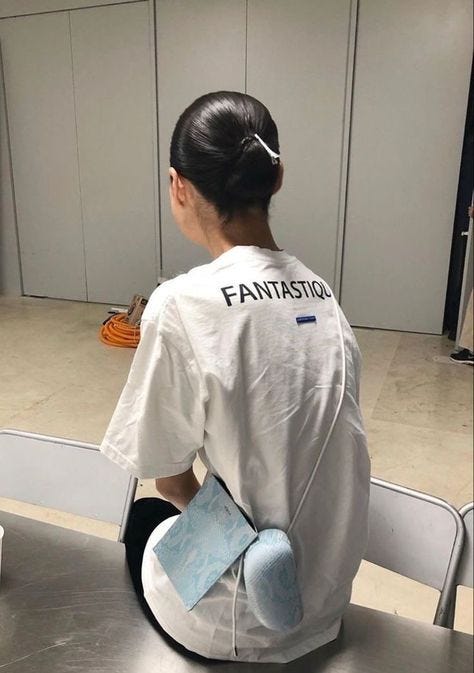“all the women. in me. are tired” — Nayyirah Waheed
for a beauty analyst, i have a notable lack of care for the crux of my job.
I’m supposed to spend my days tracking trends and bringing them to my agency’s attention. Right now there’s a focus on exosomes and aesthetic medicine. We want to get ahead of what could be the “next big thing”.
Since I’ve begun my internship, and therefore working in the beauty industry, I’ve noticed I’ve abstained more and more from being beautiful. It’s more of an effort to do my skincare routine in the morning, to slather on makeup for the office in the hopes of looking more alive than I feel sometimes.
I barely touch my face anymore, which is both relaxing and unlike myself. I love makeup. I love skincare. I love the dewy sheen of my skin when I pack on product after product. I spend hours pressing my fingers into my cheeks, watching the skin sponge and gleam before bouncing back up.
I like looking healthy. I spend so much time on it—a by-product of a health-fanatic mother (I love you, manman). I like watching get-ready-with-me videos where the glowing moons of other women’s faces fill my screen late at night, their voices low and soothing as they promise me that this is the holy grail of all things skin-related.
But now, I rarely check on what’s trending outside of the hours I spend clocked in. Maybe I’m traumatized by the horrific breakout I suffered last month on both cheeks. Every time I look in the mirror I see the dark spots where I wouldn’t stop squeezing and teasing and pushing. I did it to myself. Maybe that’s why I don’t like to look at it much.
I spent the week with my eldest sister and it was the most relaxed I’ve been in a while.
I abstained from a lot of things I typically indulge in: waking up early, avocado toast, listening to music, and writing. To name a few.
The music one was the biggest. I sat on the deck and listened to the sound of the world moving around me, her dog laid out in the sluggish heat next to me. The wind was the loudest it’s ever been.
Most notably, I overpacked as I typically do and shoved my bulging makeup bag into my weekender only to not once use it throughout my stay. I didn’t realize it until I came back home to my parents.
On an evening walk with her, I told her that the more I become aware of how many treatments, adjustments, and products are pushed at consumers daily, the less I use.
I want to know what I look like, I said.
I’ve heard horror stories via influencer vlogs of how they keep getting work done because they don’t know what they look like anymore. They engage in practices that push them further away from who they used to be and that’s utterly terrifying to me.
To look in a mirror and wonder who’s staring back is a nightmare. But it got me thinking and connecting the dots to another train of thought that’s been needling at me.
This concept of being unaware of what you look like lies not only on the fringes of the beauty industry but also in social aspects. More specifically, in the ability to repackage misogyny.
Early into the summer, I was venting on a late-night car ride to my second-eldest sister. We were coming home from one of her soccer games and occasionally I experienced partial blindness at the hands of far too bright high beams.
Essentially the conversation was this: I was tired of the misogyny of gay men going undiscussed and without consequence. This was brought to mind by the ever-endless bashing of Megan Thee Stallion by Nicki Minaj's fanbase—a community largely composed of gay and queer men.
It’s a line I feel is so thin because yes stan culture in its entirety is toxic, but there’s a layer of it that certain fanbases have due to the connection between idol and identity.
In a Cherwell article, Fionn McFadden writes:
Gay men see ‘divas’ like Judy Garland, Diana Ross, and Lady Gaga as wielding the power to overcome the oppression of straight men, and attempt to attain some measure of this same power through idolisation.
In a 2018 article, journalist Brian O’Flynn wrote the following:
The love-hate dynamic of gay stan culture that Bronski describes is now largely mediated through social media. Heckling in smoky nightclubs has been replaced by “hate memes”, when stans circulate unflattering edited pictures or examples of a star’s least-becoming behaviour, while the cheering has morphed into a lexicon of superlatives and put-downs that may seem impenetrable to the uninitiated: “we stan” favoured female pop stars, they’re “iconic”, a “kween”, an “unproblematic fave”. “She outsold” describes both someone’s commercial successes and a general sense of their superiority. Anyone who fails to meet those standards? “Fat”, “flop”, “failure”.
This is not to say that gay men cannot take part in these spaces or that they have no right to the things they love. But still, something irks me when I see the defense of Nicki Minaj go from quoting chart statistics and videos comparing stage presence/performances to mocking Megan’s violence at the hands of a man or commenting on her appearance, even going so far as to say that she’s built like a man—a popular epithet from the mouths of racists against dark-skin Black women.
It goes back to the theme I began with: do you even know what you look like?
Here you are, a gay man engaging in misogyny in order to “defend your fave” and here I am: the woman experiencing the patriarchy you’re upholding.
It’s even more jarring when I hear the immediate excuse of “I’m one of the girls” and so I should let it slide. I’m doing too much when angered and upset. You’re not crossing the line when you say Megan deserved to be shot because it’s karma against her perceived slights against Nicki, but I am when I remind you that you’re still a man albeit a man who likes men.
Here you are, still a man but a little different, and here I am, a woman experiencing the violence you’re upholding.
McFadden touches on this with a well-worded paragraph that leaves a streak of red in my mind.
Misogyny from gay men runs even deeper and in even more overtly damaging forms. As already stated, a key source of misogyny from gay men stems from their lack of sexual attraction to women, creating a feeling of immunity from one of the key tenets of patriarchal oppression: sexual violence. A pervasive issue, and an almost universal experience for women, sexual violence takes many forms: sexualisation, verbal abuse, physical abuse, and others besides. And gay men, as well as straight men, perpetrate them all.
I would even go so far as to say that there is a feeling of immunity from gendered violence. Queer men have the dangers that come with being who they are without shame and I will never lose empathy for them, especially as a bisexual woman.
And yet, there is still a level of violence that is guaranteed for me as a woman (and a woman of color) that I’m unable to change because I am unable to mask my skin or outright gender expression.
I am ever a trend for you to partake in.
Non-black gay men (more white men) often adopt the vernacular and (usually stereotypical) mannerisms of black women to indicate their sexuality, something that makes me uncomfortable and confused.
Why is this a denotation of where your attraction lies? You’re from fucking Wisconsin.
Why do you get to put on aspects of my culture like a costume and strengthen the racist and sexist notions of black women being “sassy” and inherently promiscuous? You don’t have an “inner black woman”. You’re white, you’re Hispanic, you’re Asian, etc.
I’m just tired of never being sure. I can never lose my survival instincts even when surrounded by the “safer” option because it’s often those who believe they aren’t “those kinds of people” who exact the most harm. My guard can never be down.
Even writing this I’m terrified of this being misconstrued, of being called homophobic or a misandrist.
I just want you to know what you look like.
When I got home yesterday, my dog acted as if I’d come home from war. This morning I took a picture of him staring up at me, his body wrapped delicately in the rose-pink sheets of my older sister’s bed.
My big-eyed baby.
At least there’s one man who truly loves me. No doubt.
It is not an oppressive, heteronormative expectation to hold a gay man to the same standards as a straight man concerning their behaviour towards women. By seeking to dismantle the patriarchy and treat women with respect and equality, you’re not a “pick-me gay” kneeling to the demands of heterosexuality. You’re simply not a misogynist. — Fion McFadden.









loved this! I agree with you and I don’t think your words will be misconstrued! your point was very clear.
I pretty much conpletely stopped using makeup after college. granted, I never used it much to begin with because my mom would only allow me to use it for special occasions until I hit high school (and i was too low energy to be messing with it daily lol). but stopping really does rewire your brain. I know I have a lot more flexibility to do so as a white woman, but I definitely do notice that men judge me more now that I no longer bother with it. I minored in gender studies at uni, it's one thing to know theory and another to have the experience of a dude sitting at a table with you and your roommate and have him pretend you literally aren't there.
funnily enough I worked in the shoe department of a store while I was at uni, and it could probably be argued that shoes were my addiction. I have at least a dozen heels I bought from the 3 years I worked there, and I never wear them anymore (not even bc I don't want to, I just don't have any reason to lol). it's kind of crazy how we're taught to value fashion and makeup and all these ways to prioritize our beauty, but then we are often mocked if we care too much or too little about it.
there are also things to say about feminity, queerness/gender nonconformity, and -- as you rightfully pointed out -- a stereotypical idea of Blackness being praised more when it is a performance by someone outside that identity than when it's someone expressing themselves in their own skin. but I don't think I can coherently verbalize my thoughts on that rn.